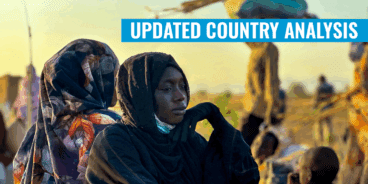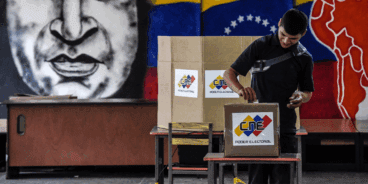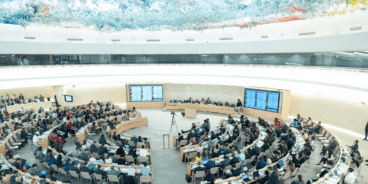
Time For Canada to Recommit to R2P
The following article, written by Naomi Kikoler, was originally published in OpenCanada.org.
“Where has Canada gone?” For the past six years that is the common refrain that I have heard from diplomats representing the world’s biggest to smallest nations when discussing the Responsibility to Protect (R2P). Twenty years after the Rwandan genocide, Canada has gone from being the most passionate and vocal supporter of the political framework for making ‘Never Again’ a real possibility, to one of its meekest.
At a recent international meeting on genocide prevention to mark the 20th anniversary of the Rwandan genocide, Canadian Foreign Minister John Baird spoke eloquently of the need to prevent mass atrocities. He argued that, “As leaders, this is our time. Let us not look back when it’s too late, and wonder if we really did enough.”
Today, as we mark Yom Hashoah, the 70th anniversary of the Holocaust, Canada is not doing enough. To rise to the challenge put forth by Minister Baird, the Canadian government must reemerge as a champion of R2P. We should robustly promote R2P and take practical steps to advance it domestically and internationally—including by actively participating in efforts to stop unfolding mass atrocities in the Central African Republic (CAR).
In the wake of the Rwandan genocide and the massacre in Srebrenica the following year, Canada led international efforts to find a way to prevent states from abusing sovereignty as a license to kill or as an excuse to be bystanders to unfolding atrocities. Indeed, Canada played a central role in the fight to secure universal support for the simple, yet revolutionary, idea that all states have a Responsibility to Protect populations from genocide and other mass atrocities. In doing so, Canada helped to create the institutions and norms that governments now use to save future generations from the horrors that my own family experienced in Europe during the Holocaust and that other Canadians have endured elsewhere.
There are few countries for which the commitment to ‘Never Again’ has been so wholly embraced. A founding member of the United Nations, Canada sent troops to serve as peacekeepers to protect vulnerable populations around the world and worked to create institutions like the International Criminal Court in addition to doggedly advocating for R2P. Today the Canadian government rarely mentions the Responsibility to Protect. Our comparative silence has an impact on international efforts to build support for and operationalize the only framework that exists for turning ‘Never Again’ from rhetoric to reality. As a senior African diplomat once said to me while he was on the United Nations Security Council, “If Canada, the country that gave birth to R2P, no longer raises it publicly or champions it at the United Nations, why should we stick our neck out to support R2P?” Foreign governments are watching what Canada says and does, especially when it comes to ideas that we once championed and that touch on sensitive matters like national sovereignty.
Similarly, Canada is largely absent from conversations about how to ‘domesticate’ R2P. Thirty-seven countries ranging from the United States and the United Kingdom to Ghana have appointed senior-level government officials to serve as a R2P Focal Point for atrocity prevention. Although Canada does participate in ad hoc conversations with a handful of like-minded states on atrocity prevention, we are not part of this broader effort to coordinate and systematize early warning and timely action. These R2P Focal Points are not merely window dressing, they are supposed to serve as the canary in the coalmine. As the then Minister of Foreign Affairs, André Ouellet, once said about the response of Canadian government officials to the Rwandan genocide, “You know we are all responsible in the sense nobody woke up on time.” These Focal Points, and their global network of government officials, exist to ensure that our governments remain vigilant so that ‘Never Again’ does not continue to be ‘again and again.’
The need to robustly support R2P and take concrete steps to implement it domestically and internationally is all too glaring. In the Central African Republic 80 percent of the Muslim community has been driven from their homes or murdered. This is a sickening indictment of the international community’s failure to heed the lessons of Rwanda on the need to act early to prevent mass atrocities. On a recent visit to Bangui, the capital of CAR, the sound of grenades and gunfire, primarily coming from the two besieged Muslim communities remaining in the city, could be heard each evening. In PK5, once a thriving market, 2,000 Muslims live surrounded by marauding armed bands who have a single goal in mind: driving out or killing what remains of CAR’s Muslim minority.
Today we stand at the precipice of yet another international failure. The Canadian government can help avert this and save lives by working with other governments, the United Nations and African Union as they develop protective strategies for CAR. This should include seeking to place Canadian officials in key senior positions within the United Nations peacekeeping mission and agreeing to deploy a small number of our armed forces and police as peacekeepers. We should also draw on the expertise of Canadian specialists in reconciliation, mediation, and state building to help foster tolerance and avert recurring conflict and atrocities, while continuing to support humanitarian relief efforts.
Finally, Canada should be advancing R2P domestically by appointing an R2P Focal Point and leading efforts to operationalize R2P internationally, including by defending R2P from detractors and taking action to save lives in CAR.
We must take these steps so that 20 years from now we are not, as we are doing today, left asking if we did enough.
Related Content


Elections, Power Transitions and the Risk of Atrocity Crimes
